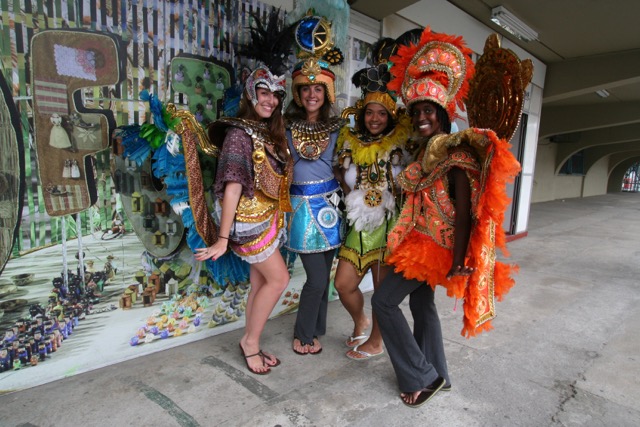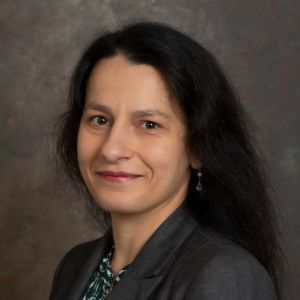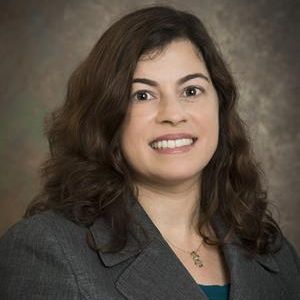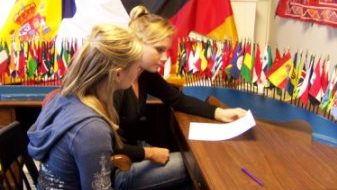
Undergraduate Programs

Global Learning Begins at UD
The Center for Global and Area Studies at the University of Delaware provides opportunities for the rigorous study of Africa, Asia, Europe, the Islamic World, the Jewish diaspora, Latin America and the Iberian Peninsula, and transnational and global issues in general. Guided by UD's global initiative that "global experience, both on our campus and beyond, is critical to our success," CGAS prepares students for an increasingly diverse and interconnected world.
Cross-disciplinary programs train students in the crucial skills needed for understanding global issues: culture, language, analysis, and experience with other cultures. They prepare our undergraduates to tackle the international topics that are constantly seen in the news cycle: globalization, multiculturalism, international business, cooperation and conflict resolution, poverty and the challenges of development, democratic development, migration, and environmental concerns, among others.
To cultivate a community-wide understanding of these issues, CGAS designs curricula and sponsors events that explore not only other countries' political and economic structures, but also their cultures, histories, arts, languages, and literatures.
Global Studies
Global Studies Major — B.A. with concentrations in world cultures, migration, or environment.
Global Studies Minor
Global Studies with Language Minor
Visit the Global Studies Major Finder Page
In fall 2020, the Center for Global and Area Studies began offering students the opportunity to major in global studies. UD has offered a minor in global studies since 2014, and the major enables students to choose it as their main area of study.
Global studies majors choose between four concentrations environment, health, migration, and world cultures. Due to its interdisciplinary nature, the global studies major lends itself to double majoring or minoring in relating disciplines.
Global studies programs emerged in the 1990s as a reaction to debates about global connectedness and the cultural effects of globalization and global forces. Whether students choose the global studies major or a global studies minor, the curriculum is designed to enable them to succeed in an increasingly globalized world by exposing them to the political and cultural foundations of global issues. The program prepares students for graduate programs, as well as for careers in government and international business or in international health, humanitarian, environmental, tourism, development, and other types of non-governmental agencies.
Students who choose this concentration will study the dependence, interactions and impact of humans on the physical environment and vice versa, including changes in these dynamics across time. It acknowledges the centrality of environmental issues to international relations, global politics, and debates relating to the sustainability of human societies in the face of growing environmental crises. Course options cover diverse but inter-related topics, such as environmental ethics, environmental anthropology, the politics and economics of the Global South (comprising Asia, Africa, and Latin America), human vulnerability to natural disasters and climate change, natural resource management, and the history of human-environmental interaction. Humanistic, natural science, and social science disciplines — including anthropology, ecology, English, geography, history, philosophy, political science, and sociology — offer a range of courses relevant to this exploration.

The courses in the global health concentration will help students develop an understanding of the influences of culture, politics, environment, and nutrition on health practices and healthcare delivery throughout the world. Not only does disease know no borders but the health and well-being of individuals and populations often have multilevel, multifactorial, biological and social determinants influenced by global politics, economics and environmental linkages. Global health is a highly interdisciplinary field that focuses on health issues that transcend national boundaries with the aim of ensuring health equity among and within nations.

This concentration will familiarize students with the significance of migration for the formation of particular cultural groups, political structures, and economic processes. Migration is a necessarily interdisciplinary topic that looks at the oft interlinked movement of people, plants, cultures, and ideas across the modern historical period. Courses will be drawn from the Departments of Anthropology, Sociology, Geography, Political Science and International Relations, and History, among others. They will examine all aspects of migration, from voluntary to forced, from new cosmopolitan mobilities to mass movements of refugees. This concentration will help students interrogate migration in relation to human rights, the outsourcing of border control, and the global imaginary that informs decisions about how and where to migrate.

This concentration considers cultures, customary worldviews, beliefs, social norms and practices, and material traits of social groups, in comparison and conversation with those of other societies around the world. Students who choose this concentration will analyze ways in which local, regional, and national cultures are produced and transmitted through generations, shaping civilizations and global narratives and interacting with each other, by studying cultural artifacts, patterns, and forms as evidenced through social and cultural research into lived experiences of people within those cultures, as well as expressed through literature, film, the visual arts, digital cultures, and musical and theatrical performance.

Global Studies
Global Studies Major — B.A. with concentrations in world cultures, migration, or environment.
Global Studies Minor
Global Studies with Language Minor
Visit the Global Studies Major Finder Page
In fall 2020, the Center for Global and Area Studies began offering students the opportunity to major in global studies. UD has offered a minor in global studies since 2014, and the major enables students to choose it as their main area of study.
Global studies majors choose between four concentrations environment, health, migration, and world cultures. Due to its interdisciplinary nature, the global studies major lends itself to double majoring or minoring in relating disciplines.
Global studies programs emerged in the 1990s as a reaction to debates about global connectedness and the cultural effects of globalization and global forces. Whether students choose the global studies major or a global studies minor, the curriculum is designed to enable them to succeed in an increasingly globalized world by exposing them to the political and cultural foundations of global issues. The program prepares students for graduate programs, as well as for careers in government and international business or in international health, humanitarian, environmental, tourism, development, and other types of non-governmental agencies.
Students who choose this concentration will study the dependence, interactions and impact of humans on the physical environment and vice versa, including changes in these dynamics across time. It acknowledges the centrality of environmental issues to international relations, global politics, and debates relating to the sustainability of human societies in the face of growing environmental crises. Course options cover diverse but inter-related topics, such as environmental ethics, environmental anthropology, the politics and economics of the Global South (comprising Asia, Africa, and Latin America), human vulnerability to natural disasters and climate change, natural resource management, and the history of human-environmental interaction. Humanistic, natural science, and social science disciplines — including anthropology, ecology, English, geography, history, philosophy, political science, and sociology — offer a range of courses relevant to this exploration.

The courses in the global health concentration will help students develop an understanding of the influences of culture, politics, environment, and nutrition on health practices and healthcare delivery throughout the world. Not only does disease know no borders but the health and well-being of individuals and populations often have multilevel, multifactorial, biological and social determinants influenced by global politics, economics and environmental linkages. Global health is a highly interdisciplinary field that focuses on health issues that transcend national boundaries with the aim of ensuring health equity among and within nations.

This concentration will familiarize students with the significance of migration for the formation of particular cultural groups, political structures, and economic processes. Migration is a necessarily interdisciplinary topic that looks at the oft interlinked movement of people, plants, cultures, and ideas across the modern historical period. Courses will be drawn from the Departments of Anthropology, Sociology, Geography, Political Science and International Relations, and History, among others. They will examine all aspects of migration, from voluntary to forced, from new cosmopolitan mobilities to mass movements of refugees. This concentration will help students interrogate migration in relation to human rights, the outsourcing of border control, and the global imaginary that informs decisions about how and where to migrate.

This concentration considers cultures, customary worldviews, beliefs, social norms and practices, and material traits of social groups, in comparison and conversation with those of other societies around the world. Students who choose this concentration will analyze ways in which local, regional, and national cultures are produced and transmitted through generations, shaping civilizations and global narratives and interacting with each other, by studying cultural artifacts, patterns, and forms as evidenced through social and cultural research into lived experiences of people within those cultures, as well as expressed through literature, film, the visual arts, digital cultures, and musical and theatrical performance.

The African studies program is dedicated to fostering the production of knowledge about Africa and its global diasporas, and in disseminating this knowledge by introducing students to the continent's contributions to the contemporary world. Africa's historical primacy, as well as its recent comparative disadvantage can in fact be understood as a function of a variety of complex factors.
The African studies program offers a minor that enriches the undergraduate curriculum and makes an important contribution to the international education of all students. At the same time, it strengthens students' knowledge and appreciation of the diversity of human culture and experience.
The current African studies faculty and affiliates are from the departments of Anthropology, Art History, Black American Studies, Foreign Languages, Civil & Environmental Engineering, English, Food and Resource Economics, Hotel and Restaurant Management, Health, Nutrition and Exercise Sciences, and Political Science and International Relations.
A recent update in the 2020-21 academic year nearly doubled the number of courses available to complete the minor. The courses are offered across several disciplines and departments, including history, political science, anthropology, art history, French, English and Arabic literatures, and public health, enabling students of all backgrounds and origins (including those who are themselves African) to examine a wide variety of issues from the often untold glories of Africa's past and present to the conundrums and tragedies of its 20th and 21st centuries.
Courses and public lectures therefore explore everything from Africa's indigenous sciences, religions, art, forms of government, architecture, culture, music, and informal economies, to the difficult histories of colonial and postcolonial trauma from Biafra and Rwanda through Apartheid and Darfur that were endured or suffered in the midst of resource-rich regions in which gold, uranium, diamonds, oil, silver, bauxite, and human capital in numbers were and are present.
Study abroad opportunities for immersion in African cultures are available in different parts of Africa, typically offered by the Program's faculty and affiliated faculty at locations that have included in Ghana, South Africa, and Egypt.
The African Studies Program at the University of Delaware supports winter session programs offered by the Institute for Global Studies. Programs are held in a number of different countries in Africa, including Ghana, Tanzania, Tunisia, and South Africa. For information about upcoming opportunities, visit the Center for Global Programs and Services at the University of Delaware.
Courses taken during these programs may count toward the African studies minor.

The African studies program is dedicated to fostering the production of knowledge about Africa and its global diasporas, and in disseminating this knowledge by introducing students to the continent's contributions to the contemporary world. Africa's historical primacy, as well as its recent comparative disadvantage can in fact be understood as a function of a variety of complex factors.
The African studies program offers a minor that enriches the undergraduate curriculum and makes an important contribution to the international education of all students. At the same time, it strengthens students' knowledge and appreciation of the diversity of human culture and experience.
The current African studies faculty and affiliates are from the departments of Anthropology, Art History, Black American Studies, Foreign Languages, Civil & Environmental Engineering, English, Food and Resource Economics, Hotel and Restaurant Management, Health, Nutrition and Exercise Sciences, and Political Science and International Relations.
A recent update in the 2020-21 academic year nearly doubled the number of courses available to complete the minor. The courses are offered across several disciplines and departments, including history, political science, anthropology, art history, French, English and Arabic literatures, and public health, enabling students of all backgrounds and origins (including those who are themselves African) to examine a wide variety of issues from the often untold glories of Africa's past and present to the conundrums and tragedies of its 20th and 21st centuries.
Courses and public lectures therefore explore everything from Africa's indigenous sciences, religions, art, forms of government, architecture, culture, music, and informal economies, to the difficult histories of colonial and postcolonial trauma from Biafra and Rwanda through Apartheid and Darfur that were endured or suffered in the midst of resource-rich regions in which gold, uranium, diamonds, oil, silver, bauxite, and human capital in numbers were and are present.
Study abroad opportunities for immersion in African cultures are available in different parts of Africa, typically offered by the Program's faculty and affiliated faculty at locations that have included in Ghana, South Africa, and Egypt.
The African Studies Program at the University of Delaware supports winter session programs offered by the Institute for Global Studies. Programs are held in a number of different countries in Africa, including Ghana, Tanzania, Tunisia, and South Africa. For information about upcoming opportunities, visit the Center for Global Programs and Services at the University of Delaware.
Courses taken during these programs may count toward the African studies minor.

Asian Studies
Asian Studies (B.A.)
Asian Studies Honors (H.B.A.)
Asian Studies with Language Minor
Asian Studies Minor
Visit the Asian Studies Major Finder Page
From China to Japan, Vietnam to Malaysia, Indonesia to India: The Asian studies program at the University of Delaware offers its majors and minors the opportunity to learn about the cultural, socio-economic and political changes transforming some of the world‘s most dynamic economies and societies in Asia. The interdisciplinary of the program also makes it easy to combine the major with other programs should students wish to do so. Popular combinations with Asian Studies include international relations, history, Japanese, Korean, Chinese and political science. The program also offers the option of a minor in Asian studies, in addition to the major.
Enrichment opportunities include study abroad in China and Japan, virtual learning opportunities with students in Malaysia, field trips, lecture and film series, and student interest groups. An Asian studies major or minor should be of interest to students seeking careers in a wide range of fields, including business, teaching, higher education, diplomacy, local government, journalism, non-profit advocacy, economic development, the environment, immigration, fashion apparel, translation, banking, historic preservation, museum curating, civil engineering, public relations, among other fields.
The current Asian Studies faculty comes from the Departments of Anthropology, Art History, English, Languages, Literatures & Cultures, History, Music, Philosophy, Political Science and International Relations, and Sociology & Criminal Justice.

Study abroad is highly recommended for students in this program.
Asian studies students have the opportunity to study language, history, and society in China, Japan, Korea and beyond through UD's study abroad program. Courses taken overseas may partially fulfill requirements for the Asian studies major or minor.

Substitutions for the courses in Asian studies programs may be made with the permission of the Asian studies program director. Independent studies courses, special problems courses and temporary/experimental courses may also count toward these programs with the director’s approval. Requests for course substitutions or approvals should be addressed to the director of Asian studies.
Asian Studies
Asian Studies (B.A.)
Asian Studies Honors (H.B.A.)
Asian Studies with Language Minor
Asian Studies Minor
Visit the Asian Studies Major Finder Page
From China to Japan, Vietnam to Malaysia, Indonesia to India: The Asian studies program at the University of Delaware offers its majors and minors the opportunity to learn about the cultural, socio-economic and political changes transforming some of the world‘s most dynamic economies and societies in Asia. The interdisciplinary of the program also makes it easy to combine the major with other programs should students wish to do so. Popular combinations with Asian Studies include international relations, history, Japanese, Korean, Chinese and political science. The program also offers the option of a minor in Asian studies, in addition to the major.
Enrichment opportunities include study abroad in China and Japan, virtual learning opportunities with students in Malaysia, field trips, lecture and film series, and student interest groups. An Asian studies major or minor should be of interest to students seeking careers in a wide range of fields, including business, teaching, higher education, diplomacy, local government, journalism, non-profit advocacy, economic development, the environment, immigration, fashion apparel, translation, banking, historic preservation, museum curating, civil engineering, public relations, among other fields.
The current Asian Studies faculty comes from the Departments of Anthropology, Art History, English, Languages, Literatures & Cultures, History, Music, Philosophy, Political Science and International Relations, and Sociology & Criminal Justice.

Study abroad is highly recommended for students in this program.
Asian studies students have the opportunity to study language, history, and society in China, Japan, Korea and beyond through UD's study abroad program. Courses taken overseas may partially fulfill requirements for the Asian studies major or minor.

Substitutions for the courses in Asian studies programs may be made with the permission of the Asian studies program director. Independent studies courses, special problems courses and temporary/experimental courses may also count toward these programs with the director’s approval. Requests for course substitutions or approvals should be addressed to the director of Asian studies.
European Studies
European Studies (B.A.)
European Studies Honors (H.B.A.)
European Studies Minor
Visit the European Studies Major Finder Page
The B.A. in European studies blends the humanities and the social sciences. This interdisciplinary major combines language training with courses in history, politics, and literature. Accordingly, it offers students a comprehensive knowledge of a particular European country and culture (e.g. France, Germany, Italy, Spain, Russia) within a broader European context. Elective courses can be taken in art history, philosophy, music, or any other subject connected to the students' chosen focus. Students are guided in designing a curriculum that will strengthen knowledge of both their target area and Europe as a whole. They are also encouraged to study abroad in Europe on a winter session or semester program.
The European studies major provides students with skills they will need in endeavors such as graduate school, careers in government or other international agencies, international law, or commercial enterprises with an international orientation.

European studies majors are strongly encouraged to spend a semester, winter, or summer session immersed in the language and culture of their country of specialization.
UD students have studied in diverse locations across the continent, including:
- Salzburg, Austria
- Copenhagen, Denmark
- Paris, France
- Lyon, France
- Leipzig, Germany
- Athens, Greece
- Sienna, Italy
- Rome, Italy
- Salamanca, Spain
- Granada, Spain
- London, United Kingdom
For more information, please visit the Center for Global Programs and Services at the University of Delaware.

Major Requirements
Students in other majors who wish to change their major to European Studies must have a minimum grade point average of 2.3. Students transferring into the major from outside the University of Delaware will have their transcripts evaluated on a case-by-case basis.
Minor Requirements
Approved in 2014, the 18-credit European studies minor incorporates core coursework in history and political science with electives available in art history and foreign languages & literatures. Students in the minor must also take a course in a European foreign language (French, Spanish, Russian, German, or Italian).
For current degree and course requirements, please visit the Academic Catalog.
European Studies
European Studies (B.A.)
European Studies Honors (H.B.A.)
European Studies Minor
Visit the European Studies Major Finder Page
The B.A. in European studies blends the humanities and the social sciences. This interdisciplinary major combines language training with courses in history, politics, and literature. Accordingly, it offers students a comprehensive knowledge of a particular European country and culture (e.g. France, Germany, Italy, Spain, Russia) within a broader European context. Elective courses can be taken in art history, philosophy, music, or any other subject connected to the students' chosen focus. Students are guided in designing a curriculum that will strengthen knowledge of both their target area and Europe as a whole. They are also encouraged to study abroad in Europe on a winter session or semester program.
The European studies major provides students with skills they will need in endeavors such as graduate school, careers in government or other international agencies, international law, or commercial enterprises with an international orientation.

European studies majors are strongly encouraged to spend a semester, winter, or summer session immersed in the language and culture of their country of specialization.
UD students have studied in diverse locations across the continent, including:
- Salzburg, Austria
- Copenhagen, Denmark
- Paris, France
- Lyon, France
- Leipzig, Germany
- Athens, Greece
- Sienna, Italy
- Rome, Italy
- Salamanca, Spain
- Granada, Spain
- London, United Kingdom
For more information, please visit the Center for Global Programs and Services at the University of Delaware.

Major Requirements
Students in other majors who wish to change their major to European Studies must have a minimum grade point average of 2.3. Students transferring into the major from outside the University of Delaware will have their transcripts evaluated on a case-by-case basis.
Minor Requirements
Approved in 2014, the 18-credit European studies minor incorporates core coursework in history and political science with electives available in art history and foreign languages & literatures. Students in the minor must also take a course in a European foreign language (French, Spanish, Russian, German, or Italian).
For current degree and course requirements, please visit the Academic Catalog.

The interdisciplinary Islamic studies program introduces students to the politics, history, anthropology, sociology, arts, and languages of the Islamic world, as well as the global growth of the Islamic economy.
The Islamic studies program is the University of Delaware's window to the Islamic world. It offers students a minor with and without language (Arabic). The interdisciplinary program introduces students to the politics, history, anthropology, sociology, arts, and languages of the Islamic world, as well as the global growth of the Islamic economy. In conjunction with the excellent study abroad programs offered by the University, students can visit some of the most exciting and interesting places in the Islamic world. Turkey, Malaysia, Tunisia, and the Muslim diasporas in Paris and London are just some of the places where students can go to experience Islamic culture.
The Islamic studies program is also a forum for an ongoing and highly enriching dialogue of civilizations between Islam and the West. Students will join with many speakers and scholars of the Islamic world in engaging dialogues that will open new vistas in their outlook toward the world.
The current Islamic studies faculty comes from the Departments of Anthropology, Art History, English, Languages, Literatures & Cultures, History, Philosophy, Political Science and International Relations and teach a wide variety of courses which address the people, religion, history, and culture of Islam, spanning from the Middle East and Africa to Southeast and South Asia, and from Europe and America to Muslim Delaware.

Students in the Islamic studies minor are encouraged to spend a semester, winter or summer in a Muslim-majority country or in a European city with a historic Muslim population. UD's Center for Global Programs and Services works with the Departments of Languages, Literatures & Cultures, History, and others to create opportunities for students to immerse themselves in Islamic cultures, languages, architectures and histories overseas.
Opportunities to study the Islamic World abroad have included programs in Tunisia, Turkey, Morocco, and Granada, Spain. For more information, visit the Center for Global Programs & Services at the University of Delaware.

The interdisciplinary Islamic studies program introduces students to the politics, history, anthropology, sociology, arts, and languages of the Islamic world, as well as the global growth of the Islamic economy.
The Islamic studies program is the University of Delaware's window to the Islamic world. It offers students a minor with and without language (Arabic). The interdisciplinary program introduces students to the politics, history, anthropology, sociology, arts, and languages of the Islamic world, as well as the global growth of the Islamic economy. In conjunction with the excellent study abroad programs offered by the University, students can visit some of the most exciting and interesting places in the Islamic world. Turkey, Malaysia, Tunisia, and the Muslim diasporas in Paris and London are just some of the places where students can go to experience Islamic culture.
The Islamic studies program is also a forum for an ongoing and highly enriching dialogue of civilizations between Islam and the West. Students will join with many speakers and scholars of the Islamic world in engaging dialogues that will open new vistas in their outlook toward the world.
The current Islamic studies faculty comes from the Departments of Anthropology, Art History, English, Languages, Literatures & Cultures, History, Philosophy, Political Science and International Relations and teach a wide variety of courses which address the people, religion, history, and culture of Islam, spanning from the Middle East and Africa to Southeast and South Asia, and from Europe and America to Muslim Delaware.

Students in the Islamic studies minor are encouraged to spend a semester, winter or summer in a Muslim-majority country or in a European city with a historic Muslim population. UD's Center for Global Programs and Services works with the Departments of Languages, Literatures & Cultures, History, and others to create opportunities for students to immerse themselves in Islamic cultures, languages, architectures and histories overseas.
Opportunities to study the Islamic World abroad have included programs in Tunisia, Turkey, Morocco, and Granada, Spain. For more information, visit the Center for Global Programs & Services at the University of Delaware.
Jewish studies at the University Delaware is an intellectually compelling, interdisciplinary program that offers a broad range of courses in Jewish culture, especially its literature, language and history, as well as its ethics, politics and philosophy.
The program’s courses allow you to explore two thousand years of a rich heritage and civilization, from its ancient origins to contemporary forms in the United States, Israel and in communities around the world. The study of Jewish history and culture provides a window for engaging with profound questions about modernity, including the impact of modernization on traditional Jewish life and the critical contributions that Jews have made to the modern world.
The University’s Special Collections at Morris Library also provide students and faculty with rare access to the papers of world-famous American Jewish writers, including Allen Ginsberg, Arthur Miller, Philip Roth and Gertrude Stein.
The program is housed in the Frank and Yetta Chaiken Center for Jewish Studies and was endowed with a generous gift by the Chaikens.
For information regarding the Jewish studies program, email Kathleen Capallo.

Jewish studies is a uniquely interdisciplinary field at UD with courses that are cross-listed and taught by faculty in the departments of History, English, Sociology, Philosophy, Political Science & International Relations, Languages, Literatures & Cultures, and others. This diverse range of disciplines allows the Jewish studies minor to enrich many majors at the University. Courses range from small, intimate seminars to large lectures. Our curriculum is enhanced by cultural events and lectures, bringing innovative scholars and artists to campus to share their work and participate in the intellectual life of the university.
Our course offerings encompass a range of modern Jewish studies, including European Jewish life, classical and modern Jewish thought, contemporary Israel, the Holocaust, American Jewish culture, as well as modern Hebrew language, literature and film.
Our course offerings encompass a range of modern Jewish studies, including European Jewish life, classical and modern Jewish thought, contemporary Israel, the Holocaust, American Jewish culture, as well as modern Hebrew language and literature. Our curriculum emphasizes the varieties of modern Jewish experience around the world today. In addition to our core curriculum in modern Jewish history and culture, we also offer courses in Biblical and Rabbinic literature, as well as medieval Jewish thought and history.
Jewish Studies Research and Conference Funds Program
The Yetta and Frank Chaiken Center for Jewish Studies is pleased to offer awards of up to $400 per academic year to support research and conference attendance in any area of Jewish Studies. All faculty and graduate students at the University of Delaware are eligible.
- The subject of research or conference presentations may address any aspect of Jewish culture in the Diaspora or Israel, including history, religion, language, literature, politics, economics, demography, philosophy and/or art. The award period runs from September 1, 2024, to August 31, 2025.
- Funds may be used to offset the cost of research or conference travel and attendance. Salary, stipends and equipment are not eligible for funding.
- Grant recipients may be asked to present their research results as part of the Issues in Jewish Studies spring public lecture series, as a guest lecturer in a Jewish Studies course or in another public forum.
To apply, send the following items in one single document to Kathleen Capallo at ktw@udel.edu:
- Brief description of the funding request.
- Brief explanation of how the research or conference relates to the applicant's research goals or professional activities.
- Line-item budget, including any available sources of support either requested or already granted for the research or conference.
- One-page curriculum vitae.
Requests are considered on a rolling basis, but should be submitted at least 30 days before the intended research or conference travel commences. The award period runs from September 1 to August 31.
The newsletter of the Jewish Studies Program at UD
The Jewish studies program spotlights faculty and student activities and other notable items in its newsletter:
-
Jewish Studies Program Newsletter - Winter 2025
February 24, 2025 | Written by UD Staff -
UD Scholarship in the Community
February 17, 2025 | Written by UD Staff -
Dr. Vivian Z. Klaff Memorial Award Winners
February 17, 2025 | Written by UD Staff -
Jewish Studies at Morris Library
February 17, 2025 | Written by UD Staff
- UD Library Jewish Studies Research Guide
- UD Hillel
- Chabad UD
- UDARI Antisemitism and the Jewish Experience Committee
- Temple Beth El
- Congregation Beth Shalom
- Congregation Beth Emeth
- Adas Kodesch Shel Emeth
- Jewish Historical Society of Delaware
- Jewish Federation of Delaware
- Halina Wind Preston Holocaust Education Committee
Jewish studies at the University Delaware is an intellectually compelling, interdisciplinary program that offers a broad range of courses in Jewish culture, especially its literature, language and history, as well as its ethics, politics and philosophy.
The program’s courses allow you to explore two thousand years of a rich heritage and civilization, from its ancient origins to contemporary forms in the United States, Israel and in communities around the world. The study of Jewish history and culture provides a window for engaging with profound questions about modernity, including the impact of modernization on traditional Jewish life and the critical contributions that Jews have made to the modern world.
The University’s Special Collections at Morris Library also provide students and faculty with rare access to the papers of world-famous American Jewish writers, including Allen Ginsberg, Arthur Miller, Philip Roth and Gertrude Stein.
The program is housed in the Frank and Yetta Chaiken Center for Jewish Studies and was endowed with a generous gift by the Chaikens.
For information regarding the Jewish studies program, email Kathleen Capallo.

Jewish studies is a uniquely interdisciplinary field at UD with courses that are cross-listed and taught by faculty in the departments of History, English, Sociology, Philosophy, Political Science & International Relations, Languages, Literatures & Cultures, and others. This diverse range of disciplines allows the Jewish studies minor to enrich many majors at the University. Courses range from small, intimate seminars to large lectures. Our curriculum is enhanced by cultural events and lectures, bringing innovative scholars and artists to campus to share their work and participate in the intellectual life of the university.
Our course offerings encompass a range of modern Jewish studies, including European Jewish life, classical and modern Jewish thought, contemporary Israel, the Holocaust, American Jewish culture, as well as modern Hebrew language, literature and film.
Our course offerings encompass a range of modern Jewish studies, including European Jewish life, classical and modern Jewish thought, contemporary Israel, the Holocaust, American Jewish culture, as well as modern Hebrew language and literature. Our curriculum emphasizes the varieties of modern Jewish experience around the world today. In addition to our core curriculum in modern Jewish history and culture, we also offer courses in Biblical and Rabbinic literature, as well as medieval Jewish thought and history.
Jewish Studies Research and Conference Funds Program
The Yetta and Frank Chaiken Center for Jewish Studies is pleased to offer awards of up to $400 per academic year to support research and conference attendance in any area of Jewish Studies. All faculty and graduate students at the University of Delaware are eligible.
- The subject of research or conference presentations may address any aspect of Jewish culture in the Diaspora or Israel, including history, religion, language, literature, politics, economics, demography, philosophy and/or art. The award period runs from September 1, 2024, to August 31, 2025.
- Funds may be used to offset the cost of research or conference travel and attendance. Salary, stipends and equipment are not eligible for funding.
- Grant recipients may be asked to present their research results as part of the Issues in Jewish Studies spring public lecture series, as a guest lecturer in a Jewish Studies course or in another public forum.
To apply, send the following items in one single document to Kathleen Capallo at ktw@udel.edu:
- Brief description of the funding request.
- Brief explanation of how the research or conference relates to the applicant's research goals or professional activities.
- Line-item budget, including any available sources of support either requested or already granted for the research or conference.
- One-page curriculum vitae.
Requests are considered on a rolling basis, but should be submitted at least 30 days before the intended research or conference travel commences. The award period runs from September 1 to August 31.
The newsletter of the Jewish Studies Program at UD
The Jewish studies program spotlights faculty and student activities and other notable items in its newsletter:
-
Jewish Studies Program Newsletter - Winter 2025
February 24, 2025 | Written by UD Staff -
UD Scholarship in the Community
February 17, 2025 | Written by UD Staff -
Dr. Vivian Z. Klaff Memorial Award Winners
February 17, 2025 | Written by UD Staff -
Jewish Studies at Morris Library
February 17, 2025 | Written by UD Staff
- UD Library Jewish Studies Research Guide
- UD Hillel
- Chabad UD
- UDARI Antisemitism and the Jewish Experience Committee
- Temple Beth El
- Congregation Beth Shalom
- Congregation Beth Emeth
- Adas Kodesch Shel Emeth
- Jewish Historical Society of Delaware
- Jewish Federation of Delaware
- Halina Wind Preston Holocaust Education Committee
Latin American & Iberian Studies
Latin American & Iberian Studies (B.A.)
Latin American & Iberian Studies Honors (H.B.A.)
Latin American & Iberian Studies Minor
Visit the Latin American & Iberian Studies Major Finder Page

The interdisciplinary Latin American & Iberian studies program provides students with comprehensive training in Spanish language and culture as well as Latin American and Peninsular history, politics, geography, anthropology, and Portuguese language.
The Latin American & Iberian studies program offers both a major and a minor designed to prepare undergraduate students for careers as Latin American, Spanish, and Portuguese specialists. This interdisciplinary program provides students with comprehensive training in Spanish language and culture as well as Latin American and Peninsular history, politics, geography, anthropology, and Portuguese language. In addition, all students are encouraged to attend a semester or winter session at a site in Latin America, Spain, or Portugal.
Many career opportunities are open to students who major in Latin American & Iberian studies. Because of their linguistic training and in-depth knowledge of these areas, graduates of the program often find employment in government, including the Foreign Service, international business and banking, and non-governmental organizations that work extensively in Latin America, Spain and Portugal. In addition, graduates are well prepared to pursue advanced degrees either in Latin American or Iberian studies or in a particular discipline.

Language Requirement
In addition to the 36 credits required of the major, students must complete SPAN 201 or demonstrate equivalent proficiency. Course work in Portuguese is also recommended. For current degree and course requirements, visit UD's Academic Catalog.
Study Abroad
Study abroad at a Latin American site for either a semester, or a winter or summer session, is highly recommended. The Argentina fall and Granada spring & fall semesters are particularly valuable for LAIS majors and minors.
Advisement and Substitutions
In selecting courses for the major, students are encouraged to meet with the LAIS director and choose courses that together reflect a regional (e.g. Mexico, Caribbean, Central or South America) or topical (e.g. colonialism, development, culture) focus. Substitutions for specified courses may be made with permission of the director of Latin American & Iberian studies so long as the same disciplinary distribution is maintained.
Honors Bachelor of Arts: Latin American & Iberian Studies
All Honors degree candidates must complete the following:
- All requirements for the B.A. in Latin American & Iberian studies.
- All of the University's generic requirements for the Honors Baccalaureate.
Language Requirement
In addition to the 18-credit minimum, students must complete SPAN107 or demonstrate equivalent proficiency on the placement test. Equivalent competence in Portuguese will be allowed. The study of both languages is strongly encouraged. For current degree and course requirements, visit UD's Academic Catalog.
Study Abroad
Latin American & Iberian studies minors are strongly recommended to attend a semester or winter session in Spain, Portugal, or at a Latin American site. For more information, visit the Center for Global Programs and Services at the University of Delaware.
Advisement and Substitutions
Substitutions may be made for the above specified courses, with permission from the director of the Latin American studies program, and only so long as the same disciplinary distribution is maintained.
Delaware Review of Latin American Studies
ISSN 1536-1837
The Delaware Review of Latin American Studies (DeRLAS) is a refereed, open-access, scholarly journal on the Internet about all aspects of Latin American society, culture and history. It is published biannually under the auspices of the Latin American and Iberian studies program housed in the Center for Global and Area Studies at UD. In keeping with UD’s “commitment to cultivate learning, develop knowledge and foster the free exchange of ideas,” and with CGAS’ mission to promote research that increases global awareness and to foster an academic community that is increasingly interconnected, DeRLAS seeks to serve as an intellectual platform for scholars around the globe dedicated to the study of Latin American society, culture and history in order to promote and amplify communication between those scholars from the North and scholars from the South interested in addressing the critical issues facing Latin America.
DeRLAS is indexed by many well-known international databases including Ulrich Periodicals, LANIC, PAIS, PSA, P42, SO2, SO3, SociolAb and the MLA Directory of Periodicals.
Copyright 2006. University of Delaware. All rights reserved.
The Language Proficiency Center in UD's Department of Languages, Literatures and Cultures offers a wide range of films, computer programs and audio resources designed to support foreign language learning. In addition, the Language Proficiency Center houses a library of over one hundred Spanish and Portuguese-language feature films and over one hundred documentaries on topics relating to Latin America. The University Museums' collection of Pre-Columbian and Latin American pieces may also be of interest to LAIS students.
Several organizations on campus (see list below) sponsor programs that focus on the historical, cultural, educational, political, and socio-economic concerns of Latinos at UD and in society at large. These programs include guest speakers, workshops, dance presentations, films, cultural excursions, and the celebration of Hispanic Heritage Month each year. Student involvement is encouraged through employment opportunities, volunteering for special projects, and program attendance and participation.
HOLA, established in 1991, is a registered student organization which represents students and staff from Latin America, and welcomes all who wish to learn more about Latin America. HOLA is committed to cultural programming, community service and mentoring via cultural celebrations, educational activities and student leadership.
Campus Resources
- UD Latino/Hispanic Heritage Caucus
- Center for Black Culture
- HOLA
- The Campus Alliance de La Raza
- Association of Latino Professionals for America
- Lambda Pi Chi
- Lambda Theta Alpha
- Lambda Sigma Upsilon
Local Organizations
- Greater Philadelphia Latin American Studies Consortium
- The Latin American Community Center
- El Tiempo Latino
Research Resources
- Databases for Latin American Studies at UD Library
- The Ronald E. McNair Scholars Program
- Fulbright Program — The Western Hemisphere
- Latin American Studies Association
- Latin American Network Information Center
- Latin American Studies
- Library of Congress' Hispanic Reading Room
- Latin American News Digest
- UD Brochure, Latin American & Iberian Studies
"I only have great things to say about the LAIS program at UD. The LAIS program prepared me to be a public health graduate research assistant in the Colorado State University Department of Anthropology and Geography. I was even lucky enough to join on a research trip to Mexico completing fieldwork on edible insects. I have also contributed to research and conducted focus groups on cattle feedyards throughout the US, speaking in Spanish and English to cattle workers to gain their perspectives on their personal wellbeing, and the wellbeing of the animals they care for. Currently, I conduct data collection in Denver of participants in the EFNEP Eating Smart Being Active nutrition program. These data collections are generally conducted in Spanish, and I love meeting with and talking to the participants, who have often just moved to the United States." — Penélope Velasco (AS 19)
"The Latin American and Iberian Studies program has been crucial in my career development. I am currently working as an English Language teacher in Massachusetts teaching all students from Latin America. Participating in the LAIS program definitely made me more marketable when applying to jobs after graduation as it showed the breadth of knowledge I gained during undergrad. The LAIS program helped build my Spanish language skills and helped me develop a cultural understanding of Latin America that is integral to my teaching practice." — Caleigh Bauer (AS 21)
Latin American & Iberian Studies
Latin American & Iberian Studies (B.A.)
Latin American & Iberian Studies Honors (H.B.A.)
Latin American & Iberian Studies Minor
Visit the Latin American & Iberian Studies Major Finder Page

The interdisciplinary Latin American & Iberian studies program provides students with comprehensive training in Spanish language and culture as well as Latin American and Peninsular history, politics, geography, anthropology, and Portuguese language.
The Latin American & Iberian studies program offers both a major and a minor designed to prepare undergraduate students for careers as Latin American, Spanish, and Portuguese specialists. This interdisciplinary program provides students with comprehensive training in Spanish language and culture as well as Latin American and Peninsular history, politics, geography, anthropology, and Portuguese language. In addition, all students are encouraged to attend a semester or winter session at a site in Latin America, Spain, or Portugal.
Many career opportunities are open to students who major in Latin American & Iberian studies. Because of their linguistic training and in-depth knowledge of these areas, graduates of the program often find employment in government, including the Foreign Service, international business and banking, and non-governmental organizations that work extensively in Latin America, Spain and Portugal. In addition, graduates are well prepared to pursue advanced degrees either in Latin American or Iberian studies or in a particular discipline.

Language Requirement
In addition to the 36 credits required of the major, students must complete SPAN 201 or demonstrate equivalent proficiency. Course work in Portuguese is also recommended. For current degree and course requirements, visit UD's Academic Catalog.
Study Abroad
Study abroad at a Latin American site for either a semester, or a winter or summer session, is highly recommended. The Argentina fall and Granada spring & fall semesters are particularly valuable for LAIS majors and minors.
Advisement and Substitutions
In selecting courses for the major, students are encouraged to meet with the LAIS director and choose courses that together reflect a regional (e.g. Mexico, Caribbean, Central or South America) or topical (e.g. colonialism, development, culture) focus. Substitutions for specified courses may be made with permission of the director of Latin American & Iberian studies so long as the same disciplinary distribution is maintained.
Honors Bachelor of Arts: Latin American & Iberian Studies
All Honors degree candidates must complete the following:
- All requirements for the B.A. in Latin American & Iberian studies.
- All of the University's generic requirements for the Honors Baccalaureate.
Language Requirement
In addition to the 18-credit minimum, students must complete SPAN107 or demonstrate equivalent proficiency on the placement test. Equivalent competence in Portuguese will be allowed. The study of both languages is strongly encouraged. For current degree and course requirements, visit UD's Academic Catalog.
Study Abroad
Latin American & Iberian studies minors are strongly recommended to attend a semester or winter session in Spain, Portugal, or at a Latin American site. For more information, visit the Center for Global Programs and Services at the University of Delaware.
Advisement and Substitutions
Substitutions may be made for the above specified courses, with permission from the director of the Latin American studies program, and only so long as the same disciplinary distribution is maintained.
Delaware Review of Latin American Studies
ISSN 1536-1837
The Delaware Review of Latin American Studies (DeRLAS) is a refereed, open-access, scholarly journal on the Internet about all aspects of Latin American society, culture and history. It is published biannually under the auspices of the Latin American and Iberian studies program housed in the Center for Global and Area Studies at UD. In keeping with UD’s “commitment to cultivate learning, develop knowledge and foster the free exchange of ideas,” and with CGAS’ mission to promote research that increases global awareness and to foster an academic community that is increasingly interconnected, DeRLAS seeks to serve as an intellectual platform for scholars around the globe dedicated to the study of Latin American society, culture and history in order to promote and amplify communication between those scholars from the North and scholars from the South interested in addressing the critical issues facing Latin America.
DeRLAS is indexed by many well-known international databases including Ulrich Periodicals, LANIC, PAIS, PSA, P42, SO2, SO3, SociolAb and the MLA Directory of Periodicals.
Copyright 2006. University of Delaware. All rights reserved.
The Language Proficiency Center in UD's Department of Languages, Literatures and Cultures offers a wide range of films, computer programs and audio resources designed to support foreign language learning. In addition, the Language Proficiency Center houses a library of over one hundred Spanish and Portuguese-language feature films and over one hundred documentaries on topics relating to Latin America. The University Museums' collection of Pre-Columbian and Latin American pieces may also be of interest to LAIS students.
Several organizations on campus (see list below) sponsor programs that focus on the historical, cultural, educational, political, and socio-economic concerns of Latinos at UD and in society at large. These programs include guest speakers, workshops, dance presentations, films, cultural excursions, and the celebration of Hispanic Heritage Month each year. Student involvement is encouraged through employment opportunities, volunteering for special projects, and program attendance and participation.
HOLA, established in 1991, is a registered student organization which represents students and staff from Latin America, and welcomes all who wish to learn more about Latin America. HOLA is committed to cultural programming, community service and mentoring via cultural celebrations, educational activities and student leadership.
Campus Resources
- UD Latino/Hispanic Heritage Caucus
- Center for Black Culture
- HOLA
- The Campus Alliance de La Raza
- Association of Latino Professionals for America
- Lambda Pi Chi
- Lambda Theta Alpha
- Lambda Sigma Upsilon
Local Organizations
- Greater Philadelphia Latin American Studies Consortium
- The Latin American Community Center
- El Tiempo Latino
Research Resources
- Databases for Latin American Studies at UD Library
- The Ronald E. McNair Scholars Program
- Fulbright Program — The Western Hemisphere
- Latin American Studies Association
- Latin American Network Information Center
- Latin American Studies
- Library of Congress' Hispanic Reading Room
- Latin American News Digest
- UD Brochure, Latin American & Iberian Studies
"I only have great things to say about the LAIS program at UD. The LAIS program prepared me to be a public health graduate research assistant in the Colorado State University Department of Anthropology and Geography. I was even lucky enough to join on a research trip to Mexico completing fieldwork on edible insects. I have also contributed to research and conducted focus groups on cattle feedyards throughout the US, speaking in Spanish and English to cattle workers to gain their perspectives on their personal wellbeing, and the wellbeing of the animals they care for. Currently, I conduct data collection in Denver of participants in the EFNEP Eating Smart Being Active nutrition program. These data collections are generally conducted in Spanish, and I love meeting with and talking to the participants, who have often just moved to the United States." — Penélope Velasco (AS 19)
"The Latin American and Iberian Studies program has been crucial in my career development. I am currently working as an English Language teacher in Massachusetts teaching all students from Latin America. Participating in the LAIS program definitely made me more marketable when applying to jobs after graduation as it showed the breadth of knowledge I gained during undergrad. The LAIS program helped build my Spanish language skills and helped me develop a cultural understanding of Latin America that is integral to my teaching practice." — Caleigh Bauer (AS 21)

















